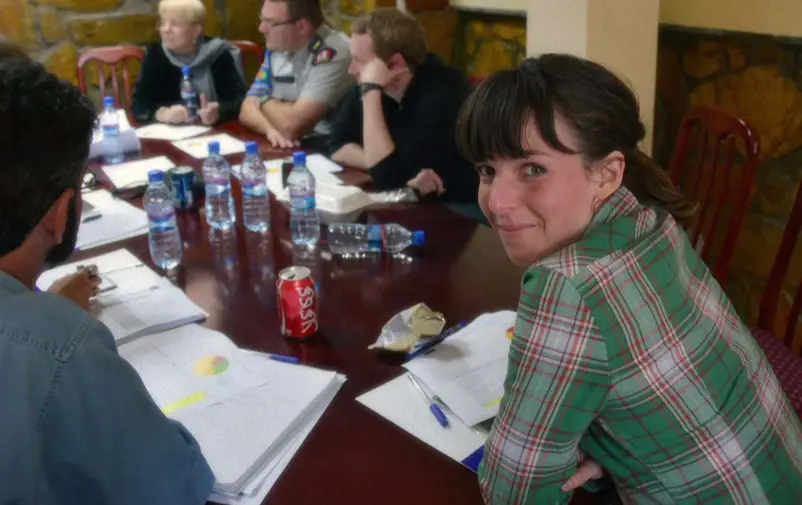
The 1325 Scholarship was established in memory of gender equality expert and peacebuilder Zaida Catalán.
Disarmament, demobilization and reintegration of former combatants, DDR, is an important part of the international work for peace. It is also one the FBA’s areas of expertise. FBA supports research and conducts training related to DDR, and deploys Swedish DDR experts to international peace operations.
A DDR programme has traditionally been carried out by the UN in a conflict-affected country after the signing of a peace agreement. Such a programme usually includes collecting weapons from ex-combatants and helping them reintegrate into civilian life by offering education, health care, support in the search for housing and a job, and support in the search for lost family and friends. If a DDR programme fails there is a risk of ex-combatants taking up arms again.
IAWG, UN Inter-Agency Working Group for DDR, consists of representatives from various UN organizations working on DDR-related issues. Over ten years ago, IAWG developed guidelines for the design of UN DDR missions. But the world’s conflicts have changed over time and therefore a review of the guidelines is needed.
On 17-20 October FBA hosted a workshop in Stockholm where IAWG discussed an update of the guidelines.
– FBA has supported IAWG since the start and we have a very close cooperation. This is why we asked the FBA to host our workshop, says Glaucia Boyer, co-chair of the IAWG.
– FBA is a key actor within the international field of DDR and we are proud to be asked to host this event. The work taking place here is also very important. The UN guidelines for DDR need to be updated and adapted to what modern conflicts look like, with increased elements of extremism, says Stefan Åström, head of the FBA’s DDR work.
The fact that todays’ DDR programmes have to be adjusted in order to take care of a growing number of ex-combatants with extreme religious or political views, was one of the issues discussed at the workshop. Other topics included DDR programmes in protracted conflicts, and DDR programmes taking place in countries without a peace deal but where combatants nevertheless choose to hand in their weapons.
The last day of the workshop included researchers specialized in DDR issues. They shared the latest research findings with the IAWG representatives. One of the topics discussed was the need to elaborate the guidelines regarding former child soldiers.
– DDR programmes of today treat ex-combatants under the age of 18 as children, and have a special track for them. Former combatants over the age of 18 are treated as adults. But in my research I have discovered a need for a third track, suited for ex-combatants who are over 18 but were involved in an armed group while underage. One could say that they are chronologically adults, but socially and economically they are minors, says Richard Bowd from The Arctic University of Norway.
– This group faces specific challenges. They often lack education, a network outside of the armed group to which they used to belong, and they have been socialized into violence since a tender age. This makes it harder for them to reintegrate into civil life, compared to ex-combatants who joined an armed group as adults. Individuals in the latter group often have had time to pursue an education, create a social network and maybe even get some work experience, before joining an armed group.
A summary of the discussions in Stockholm will now be used as a foundation for the update of the UN DDR guidelines.
– We will continue our work and we also look forward to deepen our cooperation with the FBA, says Glaucia Boyer.
MORE FROM HOME
Are you a young peacebuilder at the beginning of your career with a strong commitment to women, peace and security? Do you have experience working in this field in the Democratic Republic of Congo or Afghanistan and want to take your commitment to the next level? Then you have the opportunity to apply for the 1325 scholarship for 2026.
2025-11-06 15:30FBA has both increased and adapted its work in Ukraine in the wake of Russia's invasion.
FBA in UkraineKlara Grenhagen works as a specialist at FBA's Africa unit with a focus on dialogue, reconciliation and peace processes.
More about our expertsFBA is part of Sweden’s development aid within the area of peace and security
Read more about the countries where we work